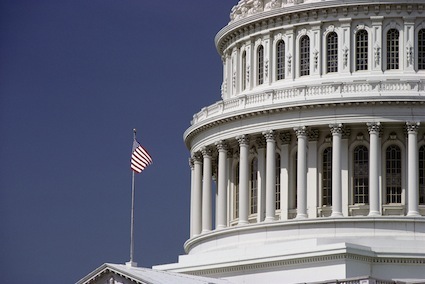FCC Reform Bill Passes in Contentious Markup
The smarter way to stay on top of the multichannel video marketplace. Sign up below.
You are now subscribed
Your newsletter sign-up was successful

WASHINGTON — A divided and sometimes contentious House Communications Subcommittee has approved all seven Federal Communications Commission process-reform bills.
That came in a markup Wednesday (May 20) that featured some sparks between the chairman and ranking member, a passionate attack on the Supreme Court's Citizens United decision on political campaign financing, and Democratic amendments defeated along party-line votes.
The summary of the markup is that all of the bills were favorably reported to the full committee, including all legislation proposed by both Democrats and Republicans.
But the story was far more complicated and contentious.
While the Democratic-backed bills — which directed the FCC to publicize how it made decisions and the status of items — were approved on voice votes without contention, the Republican bills were strongly opposed.
For example, ranking member Rep. Anna Eshoo (D-Calif.) offered an amendment to the formerly bipartisan FCC Process Reform Act, another of the seven bills being marked, that would have removed a one-year delay in implementation of the provision for allowing more than two commissioners to get together outside public meetings, something Eshoo has been pushing for years.
Chairman Greg Walden (R-Ore.) said he had been surprised by the amendment, given that when the same bill was introduced in the last Congress (and approved by the House), he and Eshoo had negotiated the one-year delay in exchange for Republicans removing cost-benefit test language from the bill.
The smarter way to stay on top of the multichannel video marketplace. Sign up below.
Eshoo shot back that she had never negotiated away her opposition to the delay.
The amendment was defeated, as was one that would have added to the legislation language from a bill introduced last month by Rep. John Yarmuth (D-Ky.) that would direct the FCC to require the on-air sponsorship identifications on TV and radio political ads from PACs and nonprofits to better identify who actually funded those ads.
Yarmuth and Eshoo spent some time speaking about the importance of requiring the enhanced disclosures, with Eshoo saying it was the most important item on the agenda and branding the Citizens United decision, which protects corporate and union political ad spending as a free-speech right, as one of the worst court decisions in history.
While both sides agreed on the need for FCC transparency, they were divided sharply over how to define it. Democrats suggested that their bills would provide transparency, while the Republican transparency bills could actually gum up the process by leading to endless merry-go-round comment cycles, throwing sand into the procedural gears rather than greasing them.
The Democratic bills approved would require the FCC to publish online its procedures for making decisions and any changes to those; report quarterly on the status of petitions and other items (an amendment was agreed to for an audit of the figures the FCC supplied); and to help increase small business access to the FCC and issues of importance to those businesses. Republicans had no problem with any of those, and they passed on voice votes.
The three Republican bills, which Democrats opposed, calling for roll-call votes which showed the partisan divide, would: 1) require the FCC to make public decisions being made on delegated authority 48 hours before the actions were taken (Republicans said that was so the public would know what was going on. Democrats said that could delay the process unnecessarily for relatively little benefit); 2) require the FCC to publish drafts of items when they are circulated to the other commissioners; and 3) require the FCC to publish the text of items within 24 hours of their being voted. (For a summary of the bills, click here.)
Eshoo suggested the publishing mandate stemmed from the network neutrality debate and the Republican request — which was denied — that chairman Tom Wheeler publish his draft of the new rules when it was circulated. Walden said that was not the case, and even chuckled at the suggestion, which did not amuse Eshoo.
Walden said the issue dated back several years, a notion was seconded by Rep. Adam Kinzinger (R-Ill.) who authored the bill requiring draft publication.
Contributing editor John Eggerton has been an editor and/or writer on media regulation, legislation and policy for over four decades, including covering the FCC, FTC, Congress, the major media trade associations, and the federal courts. In addition to Multichannel News and Broadcasting + Cable, his work has appeared in Radio World, TV Technology, TV Fax, This Week in Consumer Electronics, Variety and the Encyclopedia Britannica.

